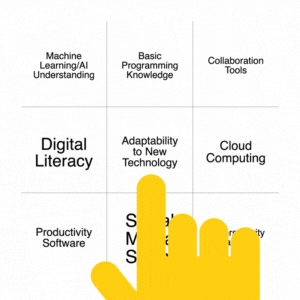10 Essential Technology Skills Every Employee Should Have

The rapid advance of technology has forever altered the face of the global workplace. Gone are the days when tasks were manually accomplished, and communications were done solely via phone calls or face-to-face meetings. Today’s dynamic work environment demands technological competence, irrespective of your job role or industry. This shift has been accelerated by the recent global events that have seen more companies adopting remote work, making digital skills desirable and necessary.
Being technologically adept goes beyond just being able to use a computer or surf the internet. It involves a comprehensive understanding of various digital tools and platforms, the ability to troubleshoot tech-related issues, and a continuous willingness to learn and adapt to new technologies. Technology is no longer confined to specific sectors or roles; it has permeated every aspect of business operations, making it essential for all employees to possess certain tech skills.
In this context, we explore ten key technology skills every employee should strive to develop. These skills can make you more effective in your current role, increase your employability, and open up new career opportunities. Whether you are a seasoned professional looking to update your skillset or a fresh graduate entering the job market, these are the tech skills you need to stay competitive and productive.
10 Essential Skills in Technology

- Digital Literacy Understanding how to use computers, smartphones, and other digital devices is foundational in today’s technology-infused world. This includes basic operations like creating and saving files, using operating systems, installing software and troubleshooting common issues.
- Internet Proficiency With most businesses now operating online, efficiently navigating the internet is essential. This involves understanding how to use search engines effectively, downloading and uploading content, recognizing secure and credible websites, and protecting oneself from potential online threats.
- Word Processing and Spreadsheets Tools like Microsoft Word and Excel or Google Docs and Sheets are widely used in business. Employees should understand how to create, format, and edit documents and spreadsheets and use functions like mail merge, track changes, and basic formulas.
- Email Communication Despite the rise of instant messaging and video conferencing apps, email remains a primary communication tool in many businesses. Employees should know how to compose professional emails, manage their inboxes, use proper email etiquette, and understand email privacy and security.
- Data Privacy and Security As data breaches become increasingly common, understanding the basics of data privacy and security is critical. This includes using strong, unique passwords, recognizing phishing attempts, and being aware of the importance of regularly updating and backing up data.
- Collaboration Tools Remote work has become more common than ever, with collaboration tools like Slack, Microsoft Teams, or Asana. These platforms require instant messaging, file sharing, video conferencing, and project management skills.
- Presentation Software: effectively presenting information is valuable, and presentation software like Microsoft PowerPoint or Google Slides is often used. Employees should know how to create, design, and deliver presentations using these tools.
- Cloud Computing More businesses are moving to the cloud, which allows storing and accessing data over the internet instead of on a local hard drive. Cloud platforms like Google Drive, Dropbox, or Microsoft OneDrive can increase efficiency and collaboration.
- Social Media Savvy Social media platforms like LinkedIn, Twitter, and Facebook are increasingly used for professional purposes. Creating content, engaging with others, and building an online presence can enhance networking and promotional efforts.
- Adaptability to New Tech Tools Technology continuously evolves, and new tools and platforms emerge. The willingness and ability to learn these new tools can keep an employee’s skill set fresh and relevant.
Technology Skills
Employees can significantly boost their efficiency, productivity, and marketability by mastering these essential tech skills. In an era where digital technologies permeate every aspect of our professional lives, these skills are not just about keeping pace with the evolving landscape; they are about staying ahead of the curve. The integration of technology in the workplace has streamlined processes, optimized time management, and enabled more sophisticated analysis and insights. These skills equip professionals with the tools to leverage these advancements and turn them into tangible business results.
Understanding and utilizing these skills can also significantly enhance an employee’s organizational value. Companies are continually seeking individuals who can seamlessly navigate the digital world, as these are the people who drive innovation and growth. These skills can make employees an invaluable asset to their team, enabling them to contribute more effectively to projects and problem-solving tasks.
The digital world isn’t a phase that will pass; it’s the new normal and an integral part of our lives. The ubiquity of technology in our professional landscape means that staying tech-savvy is no longer just a nice-to-have—it’s a critical skill set necessary for every professional, regardless of their industry or role. It’s about being prepared for the future of work, which is becoming more interconnected and tech-driven each day. By embracing these skills, employees secure their place in this future and become active contributors to shaping it. So, investing in these skills is not just beneficial—it’s essential for professional growth and longevity.

